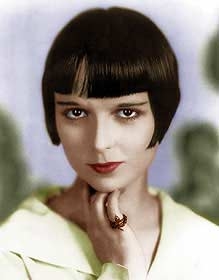"Lulu in Hollywood"

Louise Brooks starred in several silent movies
" The Brooks family were poor English farmers who came to America on a merchant ship at the end of the eighteenth century. They settled in the mountainous northeastern part of Tennessee. During the Civil War, they fought against the slaveholders who owned plantations in western Tennessee. In 1871, my great grandfather John Brooks, with his son Martin and Martin's young family, journeyed by covered wagon a thousand miles across Tennessee, Arkansas, and the corner of Missouri to homestead in the southeastern part of the free state of Kansas. The government let them have one hundred and sixty acres of land near the village of Burden. There they built a log cabin, ten feet by twelve, in which all twelve members of the family had to live. The Pawnee and Cherokee Indians had already been driven into a reservation in the Oklahoma Territory, to the south, while the last of the Plains Indians were then fighting hopelessly against the United States Army and Cavalry, which soon swept their survivors west into Colorado. Furthermore, by 1875 the Indians' subsistence the millions of buffalo had been slaughtered by the white hunters. Thereafter, homesteaders poured in.
My father, Leonard Porter Brooks, who was the second of eight children. was born in 1868, before the family left Tennessee. He became a lawyer, and in 1904, at the age of thirty-six, married my mother, Myra Rude, who was nineteen. They moved to the little town of Cherryvale, Kansas, where Father worked for the Prairie Oil Company until it was gobbled up by John D. Rockefeller. Mother bore four children: Martin, in 1905; Louise, in 1906; Theodore, in 1912; and June, in 1914.
A small, black-haired man, quiet, cheerful, and energetic, my father had only two loves throughout his life--my mother and his law practice. He dreamed of becoming a United States district judge--an unrealizable dream, because his abhorrence of boozing, whoring, and profanity made him unacceptable to the rough politicians of his day. In 1919, we moved to Wichita, where my father had a general law practice and where a common joke was that "L. P. Brooks is so honest that his secretary makes more money than he does." However, when he was nearly eighty, his integrity was rewarded by his being made an assistant attorney general of the state of Kansas. He died in 1960, at the age of ninety-two.
My mother was born in Burden, Kansas, in 1884, to Mary and Thomas Rude, who was a country Doctor. Because he was the only doctor for miles around, the villagers, though they were a puritanical lot, found it necessary to condone much in him that they would never have forgiven in others-drinking, smoking, swearing, and refusing to go to church. He delivered babies, set bones, and eased the pain of the dying with morphine. When the weather was good, he drove to see his patients in a horse-and-buggy. When the weather was bad, he rode horseback. And when the weather was very bad and the horse could not find its way in the snowdrifts, he went on foot. A few of the patients paid him with money, some with pigs or sacks of corn, many with nothing at all.
As the eldest of six children borne by a tiny, withdrawn mother who "enjoyed poor health," Myra Rude had been forced to sacrifice her girlhood to the care of what she called 'squalling brats." When she married, she told Father that he was her escape to freedom and the arts, and that any squalling brats she produced could take care of themselves. And that is what happened. My mother pursued freedom by writing book reviews to present at her women's club, by delivering lectures on Wagner's Ring, and by playing the piano, at which she was extremely talented. When my older brother and I got into a fight, my father would retire to his law books and violin on the third floor, and my mother, who had a sense of the absurd which almost always reduced crime and punishment to laughter, often simply laughed. She did, however, foster my dancing career. It began when I was ten; both my mother and I hoped I would become a serious dancer. From the time I was ten, when a Mrs. Buckpitt came eight miles by train from the town of Independence to the village of Cherryvale to give me dancing lessons, I was what amounted to a professional dancer. I danced at men's clubs, women's clubs, fairs, and various other gatherings in southeastern Kansas. I was given to temper tantrums, brought on by an unruly costume or a wrong dance tempo, but my mother, who was my costumer and pianist, bore them with professional calm. My father thought I had been mutilated when Mother, in the interests of improving my stage appearance, had a barber chop off my long black braids and shape what remained of my hair in a straight Dutch bob with bangs. He called my dancing career "just silly". "
Later in the book she says, "My Mother was an exquisite, self-taught painter, who began her musical training in 1903 on a church organ in the village of Burden, Kansas"